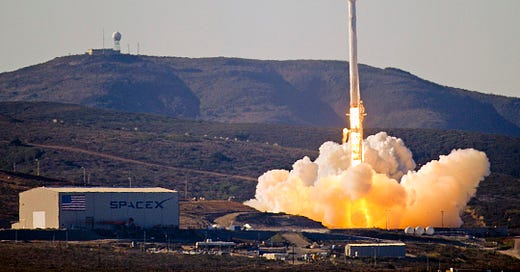Creating Leverage and Achieving Freedom by Entering Strategic Economic Sectors
Why it's important in the negative world to establish positions in essential industries
Where should people be looking to establish themselves economically in the negative world?
Although not concerned about the negative world per se, Elon Musk provides an interesting example. He went into highly strategic sectors deeply tied to the US government, notably rockets, satellite internet, and electric vehicles.
This exposure to the government, which some critics have derided as rent seeking, would seem to make him extremely fragile and vulnerable to pressure. Yet, what we see is that he might be the most independently minded billionaire businessman in the country. He purchased Twitter and has been taking steps to eliminate some of the censorship that had been imposed on the platform, much of it applied in concert with the US government. He’s done this despite opposition from the American power structure, the “disinformation” industry, etc.
How has he gotten away with this?
Musk needs the US government, but they also need him. China is heavily investing in space, and SpaceX is what has kept the US in the technological lead. Also, his Starlink internet platform has proven critical to the war effort in Ukraine. And again, Tesla has been critical to the green energy transition and to keeping pace with China in the electrical vehicle space.
In short, Musk inserted himself into critical spaces necessary to support US economic and geo-strategic competition with China. It’s very clear that he’s intimately involved in these companies, and if the government pushed him out somehow, these companies would badly slow their pace of innovation and likely stumble.
By occupying these strategic points, Musk created leverage for himself. Now, there are certainly a lot of left ideologues who would rather lose a nuclear war with China than see any rollback or threat to their politics. But most of our leaders are more sane than that. They want to make sure we stay in the lead in these critical strategic technologies
Musk shows that establishing a key position in strategic sectors, fabric of the economy businesses, or truly essential services creates leverage.
Another person who figured this out was Christian businessman Camden Spiller of Maddox Industrial Transformer. He and his brother founded the company to disrupt the electrical transformer space. Traditionally, transformers were custom ordered, with two year lead times for production. Maddox operates instead as a stocking distributor, carrying transformers in inventory.
Again, heavy industrial transformers are critical to the electric grid and all kinds of industries. There aren’t a lot of spares lying around out there. This has caused problems for Ukraine in repairing its electrical grid after Russian attacks. Countries around the world have been scrounging to find transformers they can send to replace those destroyed by Russian attacks.
When a utility or industrial concern needs a transformer, they don’t have the luxury of applying ideological filters to how they get it. The Spillers and Maddox were able to insert themselves into a key position in the industrial supply chain, delivering high value - and landing their company on the Inc. 5000 for four straight years - and creating leverage for themselves as well. As Camden Spiller put it, “They gave us the roadmap with Covid. We need to be in these essential businesses.”
These sorts of sectors might seem like they are high risk. But because of their importance to the economy and even US geo-strategic competitiveness, they can actually be attractive places for heterodox thinkers to set up shop.
I realize most of us are not going to be starting a rocket company. But for those with an entrepreneurial bent, thinking about how to carve out a key position in a strategic sector is a way to create leverage and achieve some degree of freedom that many of us may never have considered.





Good thoughts. I wasn't familiar with Camden Spiller.
I think about this a lot in terms of guiding my kids, if they too have a penchant for business. My career was launched on the big-city corporate side, but we need to consider the possibility that the path I followed will, in the not-too-distant future, require more or less denying the faith in order to get along.
My thought for my kids up to now has been to suggest siding with the conservative-leaning "local gentry" as opposed to the left-leaning "professional-managerial class". The best way I know of to make money in this fashion is real estate.
But of course, one downside is there's a lower ceiling on rewards, and also on the IQ of who you'll be working with, if you affiliate with the local gentry. For those with bigger aspirations, Aaron's approach here is as good as anything I can come up with.
Aaron didn't say it here, but there's also something to be said for having a business that's not very visible. Which doesn't apply to Musk but does apply to Spiller. A B2B business is generally less visible than a B2C one, and industrial transformers are pretty obscure even by B2B standards. No one knows who makes industrial transformers, probably less than half the population knows what they do, and less than that thinks about them once in a given year. All of this makes it less likely that you or your business will be targeted.
Great writing, Aaron. I would add, so long as we don't have any kind of Georgist tax policies being passed in the near future, land ownership will be a pretty key form of leverage in Negative World.